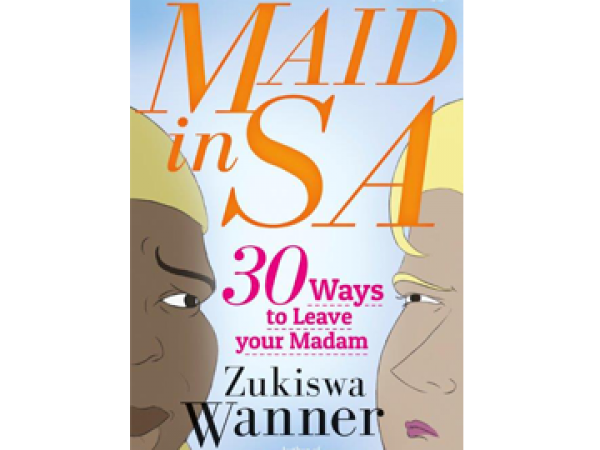Maid in SA: an extract from Zukiswa Wanner’s latest book

Novelist Zukiswa Wanner is well known for her fast-paced, witty novels. Her racy narratives and intelligent humour offer razor-sharp insights into contemporary urban life, placing the new black middleclass under the magnifying glass.
A founder member of the ReadSA initiative, she also featured in Africa Report’s People to Watch 2010 and Mail & Guardian’s Book of South African Women 2010.
Her debut novel was The Madams (Oshun Books, 2006), a controversial “comedy of manners” about the New South Africa. This was followed by Behind Every Successful Man (Kwela Books, 2008), “a funky, witty tale of a mother turned entrepreneur to the great exasperation of Andile, her husband and BEE tycoon”.
Her last novel, Men of the South (Kwela Books, 2010) is a gripping read and shows Wanner’s maturation as a writer. It was shortlisted for the Commonwealth Writers’ Prize 2011: Africa Region. The novel weaves together the stories of three men: Mfundo, a musician and failing dad; Mzi, a married man who is gay, and Tinaye, a displaced (but successful) Zimbabwean living in South Africa.
Now Wanner returns to her earlier subject, the domestic worker in Maid in SA: 30 ways to leave your madam. It is an accessible, deceptively light-hearted look at a fundamental “institution” in South African life and history, covering workers – not only South African but Zimbabwean and Malawian, and their madams — poor-white, liberal “rich”, and the new African madams.
EXTRACT: African Madams
There is only one type of black madam. The middle-class African madam. As mentioned before, the rich African madam is not counted here as she, her Indian and her white counterpart have transcended race. The middle-class African madam on the other hand, is aware of race and in the same way her white counterpart claims to have black friends she goes home and says, “eish, these white people,” in disgust.
Poor African Madams?
There are no poor African madams. Siriyas. Poor women who work and need assistance with the children usually go emakhaya and get one of their poorer relations to come and help out. As you are family, you will not be paid but instead will have school fees paid to do a call centre course. As your poor relation cannot afford to send you to Quest or any of the big brand names that do placements, the call centre college you go to will be one of the fly-by-nights ones that do not do placements. You will discover this bit of information after the course. So while waiting for some response from all the companies you sent your CV to - which, sorry for you, may never come - you become the domestic worker de jure of your poor relation. You feel guilty because you are not contributing to all the food you eat so you wake up and get the children ready for school and then you walk them to school. Or, if there is a toddler because your aunt, sister or cousin (who is generally a single mother) cannot afford to take them to pre-school, you spend the day looking after the child. You make all the meals, generally consisting of mdoko for breakfast, tea and bread for late brunch and then a proper supper when your aunt/sister/cousin is coming back from work. Sometimes if you remain with the child, there may also be maas and iphuthu for lunch. There is not much variety to the meals. It’s pap and cabbage. Pap and spinach. Pap and boerewors whose stuffing may or may not be beef. Umqhusho and gravy and if you are lucky, boerewors. Except on Sunday. Now Sunday is the big day with the big meal. The day that the Lord has made will ensure that you too eat the meal that all your neighbours are eating after church. Rice with some curry to make it yellow and give it colour, roast chicken, roasted potatoes, butternut or pumpkin, coleslaw, potato salad and mixed vegetables. If it appears to you that there are too many carbohydrates in the meal, then you are probably not hungry enough and not happy to have a meal this special. As the chicken is a product of the no-name packs from supermarkets, everyone will have a leg or a breast. Your aunt/sister/cousin’s only hope during this period is that you will not get pregnant from one of the township boys before you get a job. You have time on your hands. You have the house to yourself while your relative is at work. You probably will. And then, when the child is born and you have weaned and sent him or her home to stay with the parents emakhaya, you come back to the city to look for a job with one of the Middle-Class African Madams.
Maid in SA by Zukiswa Wanner
ISBN 9781431408962
100 pages
Review written by Brent Meersman for GroundUp.
Support independent journalism
Donate using Payfast

Don't miss out on the latest news
We respect your privacy, and promise we won't spam you.
Next: Cape Town’s last refugee processing centre might close
Previous: South Africa is at an economic impasse - an interview with Mark Heywood

This article is licensed under a Creative Commons Attribution-NoDerivatives 4.0 International License.
